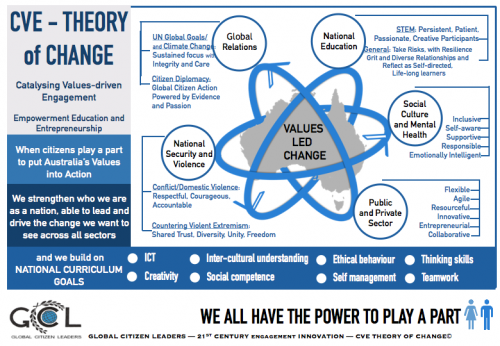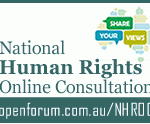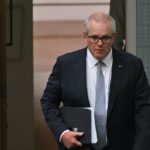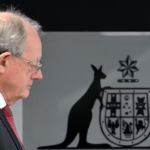Dirt, poetry and a system’s response to shape our nation in our image
The footage obtained by investigative current affairs television program Four Corners showing the abuse of children inside Northern Territory youth detention centres left the nation reeling a few weeks ago. Kate Sinclair wonders if by acts of omission we as ordinary citizens may have contributed to what was revealed.
Sometimes ‘the nature of things’ is summed up with the saying – we are all made of dirt and poetry. This paradox is evident in the Four Corners video when guards shackle Dylan Voller to a chair.
When I listened to these guards in the ABC program I did not feel their actions reflected hatred, venom or retribution. They seemed to care, asking ‘Is it a bit alright’ (referring to the tightness of a strap), and they reassured him, ‘We don’t want you staying in here’ and ‘You’re doing well’. That they were in the process of conducting the most heinous act of sanctioned cruelty imaginable in an institution in our nation is no doubt the dirt part of who we are capable of being.
As a citizen I have seen the dirt and the poetry in action around the abuse of children for a long time. Over the course of two decades I chipped away at the corridors of power to help address the ignorance mainly in our legal system around practices that cause harm to children. Given my child advocacy focus, what I am about to say may shock readers. Firstly, I want to be clear: the view I state has nothing to do with the ache I feel, and our nation feels, for the unequivocally inexcusable tragedy that Dylan and others have lived through at the hands of those paid to serve and protect.
But I feel for the guards too – they also deserve our compassion. Here’s why: They are the product and symptom of a culture that we have all (unwittingly) played a part creating.
Beyond blaming others
To have a conversation about our own role creating our culture it will help to suspend, for a few moments, our view that we can’t possibly play a role in actions we know nothing about, or suspend the idea that our actions cannot influence legal or illegal events, thousands of kilometres away.
It will also help to put to one side our understandable focus on government failures, evident in shut downs of successful youth programs, such as the national Youth Connections initiative in 2014, or the Queensland youth mental health centre in 2014, with several deaths now being attributed to its closure. These too are just symptoms of a bigger problem in our culture – perhaps most glaringly spotlighted in the 2015 Boarder Force Act ‘gag rule’ which has potential to imprison professionals if they speak out about abuse they see in their care — a rule which may also result in the ongoing abuse of children; and exemplified in the government attitude underpinning the 2014 budget, such as when it tried to cut access to benefits for six months if young people were unemployed.
For now, I think it most productive to move beyond symptoms and to start to consider how we as ordinary citizens may, by acts of omission, have contributed to what was revealed in the Four Corners program last month. Consistent with changes around the globe, Australia feels to me like a culture where we are all too busy, too caught up staying on top of things to invest as citizens in shaping our future together. It is in this context that a culture seems to be emerging where we are increasingly big on opinion that is more and more bereft of thought. I think our increasing withdrawal from deeply considered opinions and citizen engagement amounts to indifference, and this indifference results in the nature of who we are as a nation steadily declining.
Before I go further down this road, which ultimately argues we cannot Royal Commission ourselves into becoming a successful 21st Century nation that is both savvy and kind, it may help to know that even though I have a bit of a history taking action against ‘system failures’ to deliver expected standards to protect children – and this history should be enough to inspire continued work against the odds for what I believe in – it feels, if I am not careful, I could be sucked into the ‘it’s pointless’ vacuum I see around me. As dramatic as this may sound, to me sometimes it even feels like we are at risk of losing Australia. Notwithstanding, while I observe the doubts that build within my own psyche and that of our nation, this Open Forum blog is my way to keep saying No to passivity in the face of others being hurt, including No to indifference to those who face harm if they speak up about it. This blog is also a way to say Yes to playing a part to strengthen a values driven society. One we can all stand proud of building together and can celebrate for being more of who we are.
A starting point to build a shift in consciousness and action
In a White House Series of Talks, the Nobel Laureate for Peace, Elie Wiesel said: “Indifference reduces the other to an abstraction… Indifference is always the friend of the enemy, for it benefits the aggressor – never his victim.” (1999)
If we are to learn from this powerful, beautiful summary, it might start with the price of indifference: it creates far too heavy a burden for far too many to carry. Not only does our indifference serve to indirectly but effectively empower the aggressor and as a result, fuel a culture that expands harm to others, it also extracts an inadvertent price: it diminishes our sense of being decent people.
Although we can all point to legitimate reasons to doubt our ability to shape the world as we want to see it — if we can accept at least one premise — that citizen indifference carries too high a price for all of society, if we can start from this place of agreement, we may progress, just a little, towards starting to see and remedying what is and always has been within our control: our self-concept as a nation and how this manifests in the laws we make and education and business systems we run.
Deciding to tackle indifference is not to say you must care about everything. In fact, in the irony of it all, I ponder if it is the extent to which people actually care about the world that contributes to the inability to act as we watch it slip further and further away from solid stable respectable standards of thought and engagement. To cover key points briefly, let it be suffice to suggest here, we accept the tenet ‘We can’t do everything— but we can do something’. It helps if we have a guiding vision.
Let’s begin our own ‘something’ by establishing the core values we want to use to shape Australia’s culture – where together, we combine poetry and dust to reflect our better selves. With big thinking and small actions, let’s aim to empower individual citizens to play a part and, if you think grass-root and grass-top strategies count, let’s begin to create a Prime Minister’s Council on Engagement to develop a Unifying Values-based Plan of Action that we can all grasp for our future and play a role creating today. Let’s begin this conversation, by sharing your views on the CVE Theory of Change as a place we can start to drive and assess Australia’s success across every sector of our society.

Kate Sinclair (Ph.D. Law) — Global Citizen Leaders. Kate’s background leaves her well suited to drive transformative system change that to many may seem audacious and as such unfeasible. Kate’s work has stimulated: national media and analysis on issues concerning children; changes to the law, statutes, and systemic level change in legal practices; and change-management in health care and occupational health practices in corporate offices, factory settings, and in coal mines.
As a change-leader Kate has: led innovative change practices bringing public and/or private sector and union leaders together to agree and implement new work practices; leadership, strategic analysis and project design at a national level for young people; mobilised creative student action projects for local global collective impact; undertaken peer reviewed research and key writing, speaking and facilitator roles; and citizen advocacy projects to penetrate barriers to change.
The ambitious systems approach Kate has developed for Global Citizen Leaders is inspired in part by President Kennedy’s work. His strategies helped us to reach for the moon — and achieve the unimaginable — and his vision led to the Peace Corps — which delivers the unimaginable. At the heart of his work was our ability to shape our future through strategies that turn what is ‘unfeasible’ into clear targets, practical action steps and commitments from ordinary people.
Kate founded Global Citizen Leaders (GCL), an engagement and education initiative, based on the tenet: We all have the power to play a part. This focus reflects a life theme: values driven work to build innovative and sustainable change that enhances skills and the wellbeing of children and adults.















